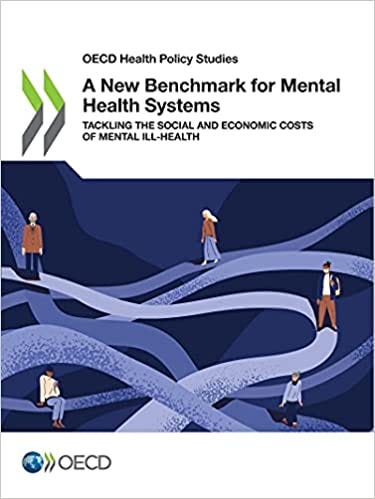Tackling the Social and Economic Costs of Mental Ill-Health
OECD
08 Jun 2021
Key points (from the OECD site)
- Mental ill-health affects millions of people, and drives economic costs of more than 4% of GDP.
- A good mental health system helps people stay in good mental health, and connects those in need to appropriate support to manage their mental health condition or even fully recover from it.
- However, mental health care has long been neglected and under-funded, and unmet need for care is still high.
- The long-lasting COVID-19 crisis and the toll it is taking on mental health has made mental health systems more important than ever.
This timely report provides an in-depth analysis of how well countries are delivering the policies and services that matter for mental health system performance.
- The report highlights recent reforms countries have taken to strengthen mental health performance, including by increasing access to mental health care, ensuring that service users take the lead in planning and even delivering services, and prioritising integration and mental health promotion.
- The report also identifies promising approaches countries should pursue to better meet their populations’ mental health needs.
- This report sets up a framework for understanding mental health performance through internationally comparable indicators, an approach set to grow stronger still in the coming years as more data become available.
Mental ill-health affects millions of people, and drives economic costs of more than 4% of GDP.
… mental health care has long been neglected and under-funded, and unmet need for care is still high.
Foreword
The burden of mental ill-health is significant. Before the onset of the COVID-19 crisis, an estimated one in two people experienced a mental health condition at some point in their lifetime, and one in five were living with mental ill-health at any given time. Since the start of the COVID-19 crisis, levels of mental distress have increased, with prevalence of anxiety and depression even doubling in some countries.
For more than a decade, the OECD has been highlighting the significant social and economic costs of mental ill-health. Mental ill-health drives economic costs equal to more than 4.2% of GDP, some of which are the direct costs of treatment, but more than a third of which come from indirect costs related to lower employment rates and reduced productivity. These costs are can be avoided, at least in part. A good mental health system helps people to stay in good mental health, and connects those in need to appropriate support, helping people to manage their mental health condition or even fully recover from it.
A New Benchmark for Mental Health Systems: Tackling the Social and Economic Costs of Mental Ill-Health provides an in-depth analysis of how well countries are delivering the policies and services that matter for good mental health outcomes. The report presents the OECD Mental Health System Performance Benchmark which responds to a call made in 2017 by OECD Health Ministers, who asked the OECD to help them better understand mental health performance across countries.
The Benchmark is a framework for understanding mental health performance, and includes six dimensions that are critical to mental health performance: from accessible, high-quality and person-centred services, to good prevention and promotion, an integrated and multi-sectoral approach, strong governance and leadership, and a focus on innovation. The Benchmark includes 23 indicators, many of which have been newly collected, which help to assess performance across countries along each of these six dimensions. The Benchmark is a valuable tool to identify key strengths and weaknesses in mental health system performance, and differences in performance across countries, which are detailed in this report. This report also highlights some of the effective policies that countries are implementing, which are already reducing the burden of mental health conditions on individuals, on societies and on economies.
Yet, overall assessment remains hampered by poor data availability. Countries must invest more in developing stronger and more widely available data on the key dimensions of mental health performance to drive faster and more meaningful improvements. In the years to come, as countries will be able to report a wider and better range of performance indicators, and the OECD will continue to support them in ensuring that these indicators are comparable internationally, the Benchmark will become an even stronger tool for measuring and improving mental health system performance. A high-performing mental health system is essential for tackling the high social and economic costs of mental ill-health, and this report helps move countries one step closer to delivering on that goal.
Acknowledgements
The preparation and writing of this report was co-ordinated by Emily Hewlett. Chapter 1 was written by Emily Hewlett, Chapters 2 and 3 by José Bijlholt and Emily Hewlett, Chapters 3 and 4 by Emily Hewlett and Yuka Nishina, and Chapters 5 and 6 by Emily Hewlett, with input from José Bijlholt. The OECD Mental Health System Performance Framework was developed by mental health experts and stakeholders from across OECD countries, with co-ordination by Emily Hewlett and Kate Cornford, and with assistance from Lukasz Lech. At the OECD, this report has benefitted significantly from input from Kate Cornford, who helped set the initial conceptual direction of this project, and from advice and input from Frederico Guanais, Rie Fujisawa, Ian Brownwood, Elina Suzuki, Niek Klazinga, David Morgan, Michael Mueller and Duncan MacDonald. The anaylsis of the report, and the range of data reported, has also benefitted significantly from exchanges, insights, and comments from Christopher Prinz and Shunta Takino. Francesca Colombo, Mark Pearson and Stefano Scarpetta provided valuable comments and suggestions at various stages of the project. Hannah Whybrow, Lukasz Lech, and Lucy Hulett provided essential support in the publication process.
This report was produced with the support of a generous contribution from the Public Health Agency of Canada, who also provided valuable feedback on the substantive shape of the project throughout. The contents of the report have been shaped by exchanges with mental health experts from OECD countries and beyond, who have contributed data, information, ideas, and enormously helpful feedback throughout the course of this project. The contributors are too numerous to name, but in particular the authors would like to thank: all those experts and stakeholders who participated in the 2018 and 2020 OECD Workshops on Mental Health Performance, and who have reviewed multiple drafts of the analysis and data presented in this report; and experts from Canada, the Czech Republic, Japan, New Zealand, Sweden and the United Kingdom whose feedback on the drafts of the Mental Health Performance Benchmarking Data and Policy Questionnaires was invaluable. The authors would also like to extend particular gratitude to the International Initiative for Mental Health Leadership (IIMHL), and in particular Stephen Watkins and Zoe Morris at the NHS Benchmarking Network, for many years of extremely fruitful collaboration on developing internationally comparable mental health indicators.
The authors would also like to extend thanks to all of the delegates of the OECD Health Committee for their responses to the Mental Health Performance Benchmarking Data and Policy Questionnaires, and for providing valuable comments on progress and summary documents presented to the OECD Health Committee in December 2018, June 2020, and December 2020, and on the substantive chapters of the report which were circulated in March 2021.
Executive summary

The economic and social costs of mental ill-health are significant.
On average, half of people experience a mental health condition at some point in their lifetime.
Living with a mental health condition makes it harder to stay in school or employment, harder to study or work effectively, and harder to stay in good physical health.
These individual and social costs also have a clear economic dimension — up to 4.2% of GDP — with more than a third of these costs driven by lower rates of employment, and lower productivity at work.
With effective mental health services, and well-targeted and comprehensive mental health policies, these costs can be at least in part avoided.
But, most OECD countries have struggled to identify whether their mental health system is delivering effective results.
This report, A New Benchmark for Mental Health Systems, will help countries to deliver the high-performing mental health systems that are urgently needed.
A benchmark for understanding mental health system performance
The OECD Mental Health System Performance Benchmark answers a call from OECD Health Ministers at their meeting at the OECD in 2017 for better tools to understand and improve mental health system performance.
The six dimensions of the Benchmark were developed by stakeholders and experts from across OECD countries. A high-performing mental health system must:
1.Be person-centred, focusing on the individual who is experiencing mental ill-heath;
2.Have accessible and high-quality mental health services;
3.Take an integrated and multi-sectoral approach to mental health;
4.Prevent mental illness and promote mental well-being;
5.Have strong leadership and good governance;
6.Be future-focused and innovative.
In each dimension, a series of measures of performance were identified or newly collected, to take stock of mental health system performance.
At present, OECD countries cannot measure mental health system performance in many of the domains that matter.
Of the 23 indicators of the Benchmark only two — life satisfaction, and death by suicide — were available for every OECD country, and there are big gaps in OECD’s countries ability measure performance in key areas such as levels of stigma, outcomes and functional improvement from treatments, service user and carer experiences, and service coverage.
The state of mental health systems: Significant gaps in performance remain
Despite the remaining gaps in data availability, the OECD Mental Health System Performance Benchmark already shows that in all countries, across the six dimensions of the Benchmark, there is scope to strengthen performance:
Person-centred care
- OECD governments make person-centred care a priority in mental health strategies,
- but nearly 20% of people with a mental health condition reported they were not treated with courtesy and respect during a hospital stay.
- Only eight countries routinely collect information about people’s experiences of and outcomes from mental health care;
Accessible and high-quality mental health services
- Availability of accessible and high-quality mental health services is improving,
- but 67% of people who wanted mental health care reported they had difficulties getting it,
- and people with serious mental health conditions still have a much lower life expectancy than the population average;
Integrated, multi-sectoral approach
- When it comes to delivering an integrated, multi-sectoral approach systematic integration across mental health, education and employment approaches remains an exception, and not the norm.
In all countries people with a mental distress were less likely to be employed, and had a lower level of education, than populations without mental distress;
Promoting good mental health and preventing mental illness
- Promoting good mental health and preventing mental illness is a key part of high performing mental health systems.
- While the rate of death by suicide is falling, dropping by 21% across OECD countries between 1998 and 2018,
- during the COVID-19 crisis the prevalence of anxiety and depression doubled in some countries, with young people especially hard-hit;
Good mental health system governance and leadership
- A key part of good mental health system governance and leadership is acknowledgement of the issues.
- OECD leaders and Ministers have been speaking out about the importance of mental health.
- However, while the level of spending on mental health care has increased in OECD countries over the past decade, the share of total health spending dedicated to mental health has only increased significantly in Greece;
Innovative and future-focused
- Countries are making their mental health systems more innovative and future-focused using new approaches to mental health support such as apps and telemedicine,
- but a future-focused and innovative mental health system also means ensuring a sustainable workforce, and having a strong data infrastructure to track and improve performance.
- In both these areas countries are falling short: for example, 11 OECD countries have only one or fewer psychologists per 10 000 population, while all countries struggle to collect a complete set of mental health performance indicators.
Some countries are leading the way with policies to tackle the social and economic costs of mental ill-health
Though there are significant mental health system performance gaps in all countries, there are also countries leading the way in implementing policies to tackle the social and economic costs of mental ill-health.
Examples of effective policies to strengthen mental health performance can be found across each of the six dimensions of the OECD Benchmark:
Person-centred care
- Person-centred care is a policy making priority in Ireland, where the office of Mental Health Engagement and Recovery engages service users in the design delivery and evaluation of services, and
- Australia and New Zealand have focused on peer-delivered services to improve person-centredness;
Access to services
- To improve access to services, for specialist mental health services
- countries have been using waiting time guarantees or targets (for example, in Denmark),
- backed by targeted increased funding (in the United Kingdom),
- while evidence from the Czech Republic highlights that outpatient treatment for severe mental health conditions is an effective and cost-effective alternative to inpatient care;
Cross-sectoral and integrated approach
- To strengthen the cross-sectoral and integrated approach to mental health,
- Australia and the United Kingdom collect information from service users on their employment outcomes,
- and Denmark stands out for having a range of initiatives to bridge mental health and employment services including “access to the workforce (for somatic and psychiatric patients)” as one of the eight national health care quality goals;
Promoting good mental health and preventing mental illness
- Children and young people have been a key focus for promoting good mental health and preventing mental illness,
- with countries such as Finland and Iceland which have been focusing on teaching social-emotional skills in schools,
- and online programmes to support youth mental health in Australia, Norway, and the Netherlands. Canada has made positive mental health promotion a priority with a dedicated Surveillance Framework;
Governments and leaders
- Governments and leaders have prioritised mental health as part of their COVID-19 response plans, and the crisis has galvanised countries to take action:
- in 2021 Chile — which in 2018 allocated the lowest share of health spending to mental health amongst all OECD countries, at 2.1% of government health spending — announced that the budget for mental health would increase by 310%, and
- in 2020 Australia doubled entitlement for sessions of psychological therapies.
- Before the crisis, New Zealand developed the world’s first ‘well-being budget’,
- England’s anti-stigma campaign (Time to Change) has improved awareness and attitudes around mental health, and
- in Canada leadership by Indigenous communities in delivering better-adapted mental health services serve as an example of a better way to support diverse population groups;
Innovative solutions to mental health challenges
- In recent years there has been an acceleration of innovative solutions to mental health challenges, including an explosion in apps and digital tools providing mental health support.
- In England, these tools are being assessed for effectiveness and listed online to help guide consumers,
- while in 2020 Canada launched a new portal for mental health resources, Wellness Together Canada, which offers no-cost wellness self-assessment and tracking, self-guided courses, apps, and other resources.
Originally Published at https://www.oecd-ilibrary.org
Some names cited
The preparation and writing of this report was co-ordinated by Emily Hewlett. Chapter 1 was written by Emily Hewlett, Chapters 2 and 3 by José Bijlholt and Emily Hewlett, Chapters 3 and 4 by Emily Hewlett and Yuka Nishina, and Chapters 5 and 6 by Emily Hewlett, with input from José Bijlholt. The OECD Mental Health System Performance Framework was developed by mental health experts and stakeholders from across OECD countries, with co-ordination by Emily Hewlett and Kate Cornford, and with assistance from Lukasz Lech.












